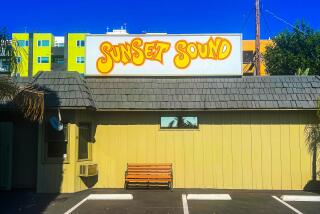Studio Apartment
- Share via
Haven, a young Los Angeles-based rock band, has a gritty sound, a soulful lead singer, some catchy original tunes and the drive to make it big someday.
What the band doesn’t have is the $175 an hour it costs to record its music in a professional studio.
But thanks to advanced digital technology, cost is not the impediment that it was in the past when aspiring musicians were at the mercy of expensive recording studios and demanding record executives.
Like a growing number of bands and songwriters, Haven is recording at home, using a run-of-the-mill PC loaded with a $40 software package that allows it to mix and manipulate dozens of tracks of music in high digital quality.
Much of this technology has been on the market for several years, but it is now so advanced and so inexpensive that it is starting to turn the music-recording industry on its ear.
‘I can do anything on this thing,’ Richard Dominguez, the band’s bass player, said as he recorded his lead singer, Denise Starbird, using Magix Music Maker software on his laptop computer.
For musicians willing to spend a bit more cash, companies such as Roland, Korg, Yamaha and others sell portable digital recording studios, which are about the size of a boom box and retail for between $800 and $2,000. The portable studios tend to be more powerful and versatile than the PC-based studios, which are limited by the size of the hard drive and the speed of the computer processor.
Big-name musicians such as Beck, BB King, George Clinton and the P-Funk All-Stars and Aerosmith are using home studios because the arrangement gives them the freedom to work at their pace and at their leisure.
And professional recording studios are feeling the impact.
‘It has driven a lot of studios out of business,’ said Jerry Harrison, a producer and former member of Talking Heads who has worked with several top-name acts that record at home.
Professional recording studios still have some advantages over the home studios, such as a better acoustic space. Many home studios are in garages, attics or spare bedrooms, where the sound of barking dogs, lawn mowers and Mom doing the dishes can put a real kink in a recording session.
Professional studios are also staffed by experienced engineers who know how to create a polished sound without having to repeatedly noodle with a recording.
Still, many musicians and producers swear by the sound quality that comes out of these home studios.
‘It does a very admirable job of replicating an expensive studio,’ said Greg McKenna, a member of the Boston-based band Letters to Cleo, who uses Cakewalk Pro Audio software on his home PC.
McKenna said he loves the convenience of being able to tinker with a song on his PC without the pressured atmosphere of a recording studio.
‘You don’t have a gun against your head to say you have to get this done,’ he said.
Both the PC programs and the portable recording studios can be connected to a CD writer, which allows musicians to burn demos for distribution to concert promoters, radio stations or record executives.
Starbird said she hopes to record three of Haven’s songs on her PC and then burn them onto a CD and distribute it with a press kit to radio stations in the area.
‘It’s a little work, but in the long run it will be worth it,’ she said.
Musicians also can convert home-recording tracks into MP3 files, which they can distribute over the Internet to generate interest in their music.
By recording on a hard disk, the PC software programs and the portable units give musicians freedom to manipulate the music in countless ways.
Special effects, such as echo, reverb and delay, can be added with a click of a button and stored on hundreds of ‘virtual tracks’ so that musicians can try several versions of the same song without having to rerecord it.
For guitar players, some portable studios include on-board ‘modeling’ effects that allow them to plug a guitar directly into the unit and simulate different types of guitars and amplifiers. In other words, with the click of a few buttons, a Yamaha guitar can sound like a Stratocaster blasting through a stack of Marshall amplifiers.
Both the PC programs and the portable studios display music tracks on a computer screen as waveforms, so songwriters can cut and paste sections of any track in any conceivable way. For example, a musician can switch verses, move a guitar solo to a different point in the song or import a drum beat from an altogether different song. And if a band’s drummer mysteriously explodes on stage, the band can create a new drum track from scratch on the computer.
The technology also is very forgiving. If a guitar track is perfect except for one sour note at the end, the musician can simply tweak the bad note into pitch without having to rerecord the entire song.
Mistakes and lost tracks are a thing of the past because the PC programs and portable studios are equipped with hundreds of levels of ‘undo’ to restore previous tracks.
‘This is the wave of the future,’ said musician/producer Ellis Hall, who turned an extra room in his Eagle Rock home into a recording studio with a Roland VS-1680 portable studio.
Hall, who has recorded music for dozens of films and television shows and recently released a solo album, is blind. But he said it took him only a few days to master his portable studio. Now he does almost all of his recording at home at his own pace.
‘It literally puts recording back in the creative hands of the musician,’ he said.
Producers, engineers and musicians say the home-studio revolution will open the music industry to many more artists, some with talent, some without.
Now, they say, cost won’t be such a forbidding barrier, and professional recording studios and record executives won’t have such a powerful grip on the industry.
‘It’s something akin to a sea change in the industry,’ said Ron Gonzalez, a part-time music engineer who writes an Internet column on home recording.
*
Hugo Martin is a reporter on The Times’ Metro staff.
More to Read
The biggest entertainment stories
Get our big stories about Hollywood, film, television, music, arts, culture and more right in your inbox as soon as they publish.
You may occasionally receive promotional content from the Los Angeles Times.











